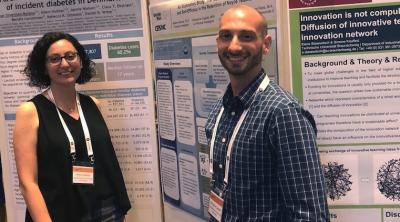Cutting-edge Research in Curricular Assessment Helped Develop a Seamless Workflow to Form a Model of Harmonious Teamwork in Action
Aug 25, 2020
Dr. Meltem Alemdar and Mr. Christopher Cappelli are no strangers to collaboration – they’ve been working together for nine years! They discovered early-on that their individual strengths naturally complement each other, and over time they’ve developed a seamless workflow.
With strengths in Input and Analysis, Cappelli loves discovering new information and often goes “down the rabbit hole” with research. As an Achiever and an Arranger, Alemdar enjoys synthesizing data and getting things done. With their combined strengths they are detail-oriented while also focused on the big picture, and together they catch things the other has missed. Alemdar explains, “With different strengths, people don’t have to be the same, and they don’t have to do everything.” For this reason, they are enthusiastic about the benefits of CliftonStrengths for team dynamics. As Cappelli puts it, “the StrengthsFinder helps avoid and mitigate conflict, because you better understand others, which creates a better team environment.” By appreciating each other’s strengths, team members collaborate instead of competing.
Alemdar and Cappelli are passionate about the benefits of diverse interdisciplinary research teams. “Diverse teams lead to different perspectives,” Cappelli remarks. “Interdisciplinary research moves the field forward and gets beyond narrow perspectives – creating new knowledge that’s not siloed.” Race and gender diversity as well as disciplinary diversity, Alemdar adds, are key to driving innovation in collaborative research: “It’s a modern way of problem-solving.”
For such teams to be effective, thoughtful cross-disciplinary communication is essential – translating unfamiliar terms, asking questions, and actively listening. Cappelli draws upon his Individualization Strength to understand other people’s points of view, and Alemdar draws upon her Communication Strength to synthesize data for researchers across the social sciences and hard sciences. Cappelli’s experiences collaborating with assessment teams in graduate school showed him that “communicating about projects is vital to success on cross-disciplinary teams” because there are so many “different perspectives with different lingo.” For example, he elaborates, “the term ‘assessment’ means something different across fields. In Education, it means testing, whereas, in another field, it might mean evaluating.” To avoid communication pitfalls with key concepts lost in translation, he says, “you need to learn how to talk to someone and ask the right questions.” Alemdar agrees: “Listening leads to better outcomes.”
In addition to their research partnership, Alemdar and Cappelli work in multiple teams on a daily basis. As the Associate Director and Principal Research Scientist at the Georgia Institue of Technology Center for Education Integrating Science, Mathematics, and Computing (CEISMC), Alemdar supervises collaborative teams doing data analysis. As a Research Associate at CEISMC as well as a doctoral student in Educational Policy Studies, Cappelli does almost all of his assessment work with teams of cross-disciplinary evaluators. And in their roles doing assessment work (Alemdar as co-PI and Cappelli as a team member) for the NSF-IGE grant-funded project “Integrating Team Science into the STEM Graduate Training Experience,” they collaborate with a cross-disciplinary team of researchers to innovate team science training for graduate students.
With their cutting-edge research in curricular assessment, Alemdar and Cappelli not only bring valuable leadership to the Effective Team Dynamics Initiative but also model harmonious teamwork dynamic in action.
As Alemdar puts it, “Collaboration is a 21st-century skill – you have to collaborate!”
Cappelli agrees: “Practice what you preach – we’re directly using the skills we’re teaching.”
Written By: Effective Team Dynamics (ETD)
This is the first article in a two-part series featuring Meltem Alemdar and Christopher Cappelli. The next post will cover their assessment work on the NSF-IGE grant-funded project Integrating Team Science into the STEM Graduate Training Experience.
The Effective Team Dynamics (ETD) initiative at Georgia Tech was developed with the intention of reshaping team experiences in a positive way through research-driven methods and reflective evaluations of thought and behavior patterns.



